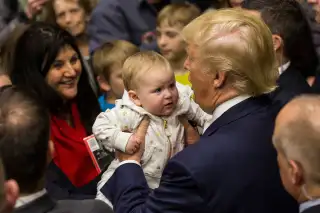3 Questions About Trump's Child Care Proposal

Ivanka Trump introduced her father at the Republican National Convention this summer as a champion of working mothers, and Tuesday night she joined GOP presidential candidate Donald Trump outside Philadelphia to flesh out a tax proposal aimed at helping parents afford child and elder care.
On Tuesday, Money asked three questions about Trump's proposal, based on broad details that had been released ahead of his speech that evening. Now, we have at least partial answers, which we've detailed below:
No. 1: How would this proposal interact with the current credits and deductions for working parents?
Trump is proposing changing the tax code to allow parents to deduct the cost of care from their income taxes, up to the average cost in their state. The deduction would be available for up to four children up to age 13 and elderly dependents and would apply to individuals earning up to $250,000 a year and couples filing jointly earning up to $500,000.
The current tax code contains provisions to help working parents afford child care. These include a dependent care child credit of between 20% and 35% of allowable expenses, up to $3,000 for one child and $6,000 for two or more. In addition, parents whose workplaces offer a dependent care flexible savings account (FSA) can have up to $5,000 deducted from their earnings pre-tax for child care expenses. (The main deductions for elder care currently apply to seniors whom the taxpayer can claim as a dependent for tax purposes.) Separately, the earned income tax credit is a benefit for working people with low to moderate income.
The Trump campaign indicated the proposed benefits would sit alongside the existing credits and deductions, not replace them."Current programs do not serve the large number of families that would benefit from the Trump plan, but if a family finds that it benefits more from existing programs, they would still be available," a fact sheet on the proposal explains. However, families cannot apply the same child care spending toward multiple programs, so they would have to choose what benefits them the most.
Among the families not currently well served by the existing tax benefits, the campaign said, are those with stay-at-home parents, who under Trump's plan would be able to claim the same tax deduction as working parents, offering them some compensation.
No. 2: Would the Dependent Care Savings Account function more like an FSA or an HSA?
Trump has also proposed creating a Dependent Care Savings Account that would allow account holders to save up to $2,000 per year, tax-free, to help offset child and elder care expenses. We wondered if this account would be structured more like a flexible spending account or a health savings account (HSA). Money in an FSA must be used by an annual deadline—either Dec. 31 or later, if the plan offers a rollover or grace period—or the funds are lost forever.
By contrast, money in HSAs does not expire. Funds can be used to pay for qualifying medical expenses now or in retirement.
Trump intends to structure the Dependent Care Savings Account more like an HSA. Materials on the candidate's web site explain that, "balances in a DCSA will rollover from year-to-year so that substantial amounts could be accumulated over a period of years." For children, funds could be used toward school tuition or enrichment activities, while for seniors funds could go towards adult day care, in-home or long-term care services.
No. 3: How would Trump get this through Congress?
Trump has not detailed how he will fund his child care proposal, which Bloomberg reported could cost about $20 billion per year. His fact sheet explains that the child care plan is part of a comprehensive tax, trade energy and regulation reform, which will discussed later this week at the New York Economic Club. It says that the child care plan itself "can be more than offset by additional growth."
If Trump is elected, the subject of funding will no doubt come up when he tries to get his proposal through Congress. Any change to the tax code would require lawmakers’ approval, which in today’s divisive climate may be hard to come by.
Every election cycle, candidates propose comprehensive tax reform, but then once they’re elected “nothing happens,” says Bill Smith, managing director at CBIZ MHM, an accounting and business consulting firm.